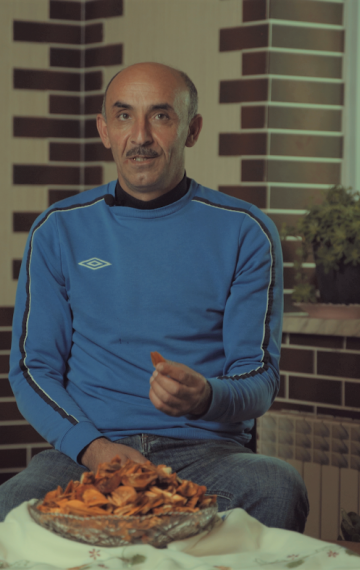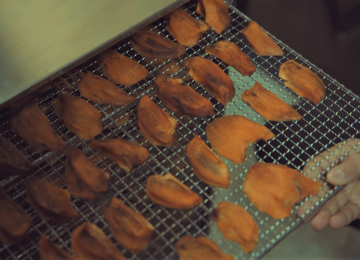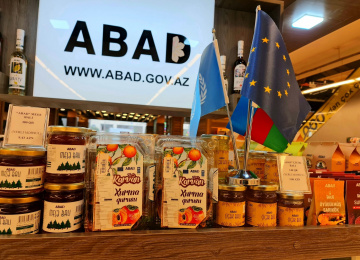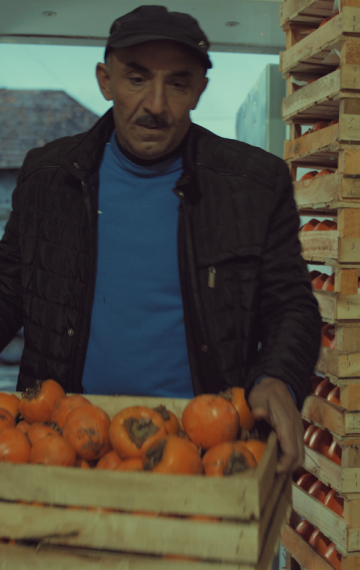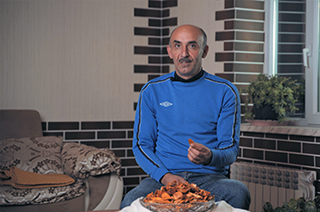
A 46-year-old farmer with a knack for organisation and adaptation, Nizami Musayev has been growing and selling persimmon for the past fifteen years in Balakan. His family is one of many small households who have helped Azerbaijan become a leading producer of this fruit.
Persimmon has many uses in a wide range of products, but Nizami’s interest over recent years has mainly been in the fast-growing market for dried persimmon sold as packaged snacks like crisps. “People love the crisps,” says Nizami, “but the traditional methods we used to dry them in the sun was very time-consuming and the results were very inconsistent. A lot of the fruit can go off early that way.”
Nizami’s entrepreneurial spirit led him to look into alternative methods of producing the snacks using modern drying machines. “I could see the solution,” he says, “The problem was how to raise the capital. And then there’s the question of how to produce and sell at a big enough scale to make the investment profitable.”
Deciding he needed to learn more about how to expand his small business, Nizami found out about the joint project being run by UNDP and ABAD and the training opportunities it offered for boosting local entrepreneurial capacity as part of an EU4Business programme to support small family businesses in the Sheki-Zaqatala economic zone.
After attending a few trainings of the project, Nizami decided to consult some fellow persimmon farming families in Balakan and involve them to the project.
“I was convinced we could gain more by pooling our resources together to make one excellent and profitable product. So I got three other families together and put forward my big proposal. ‘Let’s unite under one common brand,’ I told them, ‘That way we can produce and sell a lot more of the same quality products.’ Once they were all persuaded, we agreed to make a joint application together for the project.”
The four families — or rather the small-scale co-operative that Nizami had brilliantly initiated — all attended the project training sessions together, learning from the field experts how best to go about making their business a success. Throughout the course, the families kept improving on their initial business idea, applying their new understanding of the importance of branding and securing regular supermarket clients.
On the strength of their co-operative plan, the project provided each of the families with professional drying ovens and refrigerators and ABAD signed a contract for the first products. This equipment was essential not only for obvious reasons of efficiency but also because such technology is a requirement for the certification of these products in order to be sold in supermarkets.
With support from ABAD, four families have already managed to get their persimmon products displayed and sold in some of the major supermarket chains, including in Baku itself, and they are increasingly hopeful of attaining a steady income. Persimmon crisps have been tasted by potential buyers as part of promotional activities in various supermarkets and now are on sale under the Caravan brand.
Their joint success is good news for their wider community too, since each family already employs some ten or so seasonal workers and their expanding business will bring more local jobs.
For now, though, Nizami’s main full-time employee is his son, whom he hopes will carry on the business and expand the cooperative.
“What I’ve learnt from all the training and the whole experience is that you’ve got to keep moving with the times,” Nizami says, “But what one should always remember is that it works best when you take people along with you so everyone gets a better chance.”
The “Support to the Development of Small Family Businesses in the Sheki-Zaqatala Economic Zone through the ABAD Regional Centre in Balakan” project is supported by the EU as part of its EU4Business Initiative and co-funded and implemented by UNDP and the ABAD State Agency for Public Services and Social Innovations. The project aims to support 44 rural families to start up and expand their own local businesses, providing them with training in business development and planning, branding and design, financial accounting and legal assistance services. The project also provides beneficiaries with the equipment they need to expand.

